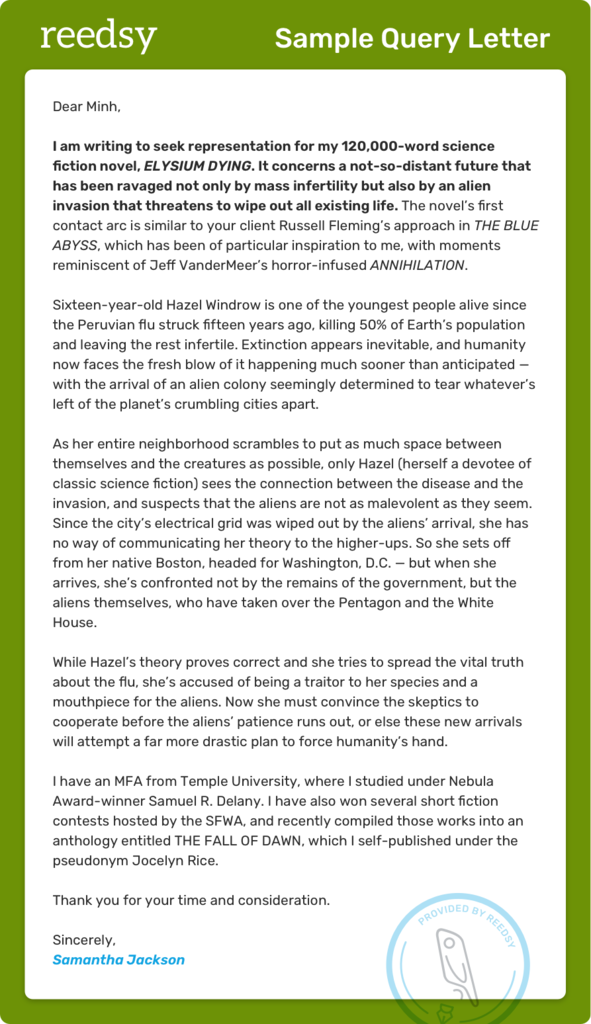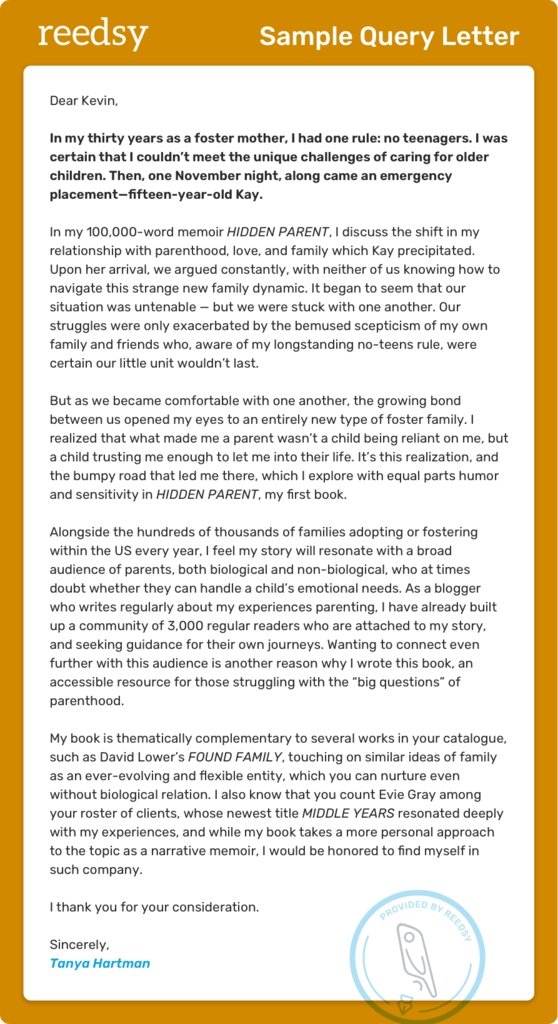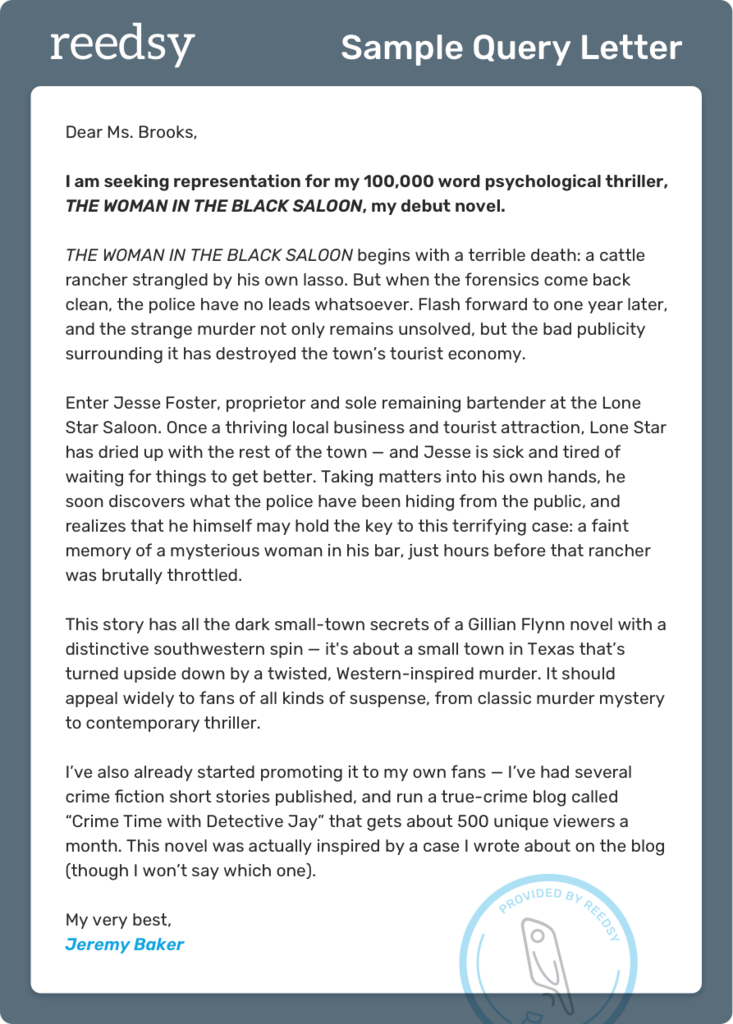Guides •
Last updated on Oct 15, 2025
5 Agent-Approved Query Letter Examples
Martin Cavannagh
Head of Content at Reedsy, Martin has spent over eight years helping writers turn their ambitions into reality. As a voice in the indie publishing space, he has written for a number of outlets and spoken at conferences, including the 2024 Writers Summit at the London Book Fair.
View profile →A great query letter — one that gets an agent to request your manuscript — is one that both checks all the boxes and is unique to you, your book, and the agent in question. To give you an idea of what this might look like, we’re sharing some query letter examples, which we polished up with the expert help of a handful of editors on the Reedsy marketplace.
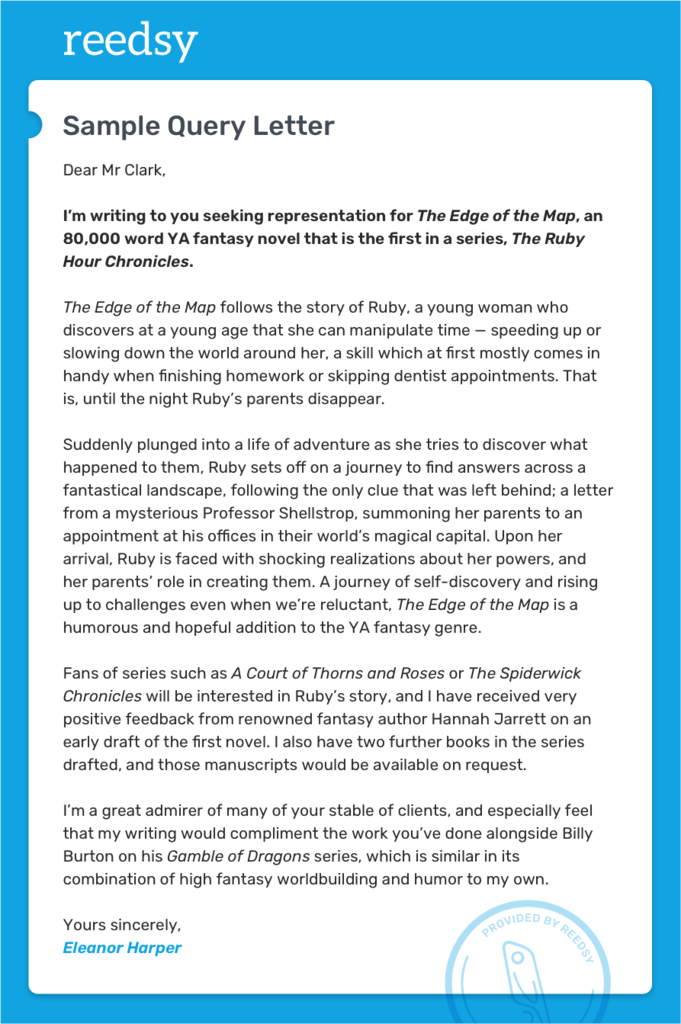 If you want to see how the sausage gets made and learn more about the editors who helped us out, check out their full query letter critiques, which show how they approach a query letter.
If you want to see how the sausage gets made and learn more about the editors who helped us out, check out their full query letter critiques, which show how they approach a query letter.
Q: How does personalizing a query letter improve request rates, and what should be tailored?
Suggested answer
I'm more concerned with whether your query letter hooks me: I want your title, genre, word count and comp titles at the front. I am even curious to know why you are the exact person to write this book (e.g., 'I'm an arctic research scientist so I set my locked room mystery in a research base', etc). You can put info about yourself in a very short about section in your sign-off paragraph. That said, it doesn't hurt to include something specific to me. For example, suppose you listened to an interview where I said I'm interested in finding a particular type of novel that yours fits with, or you connected with something I posted on social media. In that case, it's good to include this. It makes me think you are keen to work with me and aren't just randomly querying. But with that said, as long as you address the letter to me and then write a strong, gripping query and telling me a small amount about yourself and what that means to you as a writer, I'm less concerned about you including extra personalisation directed at me.
Ariell is available to hire on Reedsy ⏺
The baseline requirement is that you need to address your query to the agent's name; "Dear agent" letters sent out as shotgun emails to five hundred agents will get rejected quickly. Beyond that...my usual suggestion is to offer one or two sentences at the beginning of the query letter showing that you've done your homework. This can be as simple as "I saw on MSWL that you're looking for more multi-POV novels," or "I saw on your agency website that you're interested in cozy fantasy." This shows that you're respecting the agent's time by making sure that what you're sending is aligned with their tastes at the most basic level. Agents know that you're probably querying about ten people at once, and they're receiving perhaps hundreds of queries a day, but the personalization makes it a little more likely they'll spend some extra time looking at yours.
Nora is available to hire on Reedsy ⏺
I think a personalized query letter achieves the same aim as a piece of handwritten, personalized mail: it shows the sender has put thought and intention into what's enclosed.
As a small-press publisher, I certainly understand that manuscript submitting is a numbers game. Authors have every right to query their manuscripts to dozens of publishers and agents simultaneously. But no one wants to be treated like a row on a query tracking spreadsheet! Dear Sir/Madam, to whom it may concern, generic language about the submission's fit within my company's catalog of publications: these tactics suggest the author is taking a slapdash approach to submitting.
Conversely, when a submitting author can demonstrate their familiarity with my press, it comes as a huge relief to me. Of course, I don't expect every submitting author to buy a copy of book I've published before firing off their manuscript. But if an author can reference a title from my manuscript wish list, or if they address me by name, or if they can say in 1-2 sentences how their book aligns with my company's mission statement, then that goes a long way!
Kevin is available to hire on Reedsy ⏺
Because many authors want to increase their chances of representation, most send out lots and lots of queries letters all at once using some form of template (Dear Agent, I'm seeking representation...). While using a template like this does cut down on time, some agents get hundreds, if not thousands, of query letters a month! What's a way you can stand out from that? Personalize the query.
Agents want to know that you, the author, not only have a good book worth pitching, in the genre the agent works in, but that you have put in the time and effort to learn why they specifically would be a good fit for your work. An author-agent partnership is not a one and done thing, but ideally and ever-growing relationship that starts by being a good fit for one another. And so, showing that you researched them by personalizing a query expresses that:
- You have done your research for that particular agent, and so take your craft seriously
- You know what they represent so are pitching them in a genre they actually represent
- Have likely researched their other clients so you have a reasonable idea of whether you might fit well with them.
On top of this, if you meet an agent at a conference or writing-related event, mention that! Again, agents get many, many queries, so if they ask you to send them stuff, or you spoke to them, remind them where you met them, and any relevant details related to your work you might have discussed. This will hopefully set you off on the right foot and be the start of a wonderful author-agent relationship.
Sean is available to hire on Reedsy ⏺
Personalizing a query is a great way of letting agents know that you've researched their tastes and interests, which also conveys that you're taking a professional, well-considered approach to querying and the industry itself. When you let an agent know that you've chosen them specifically because of the clients and/or books they represent, because of their online presence, or because of an interview they've given, it shows them you've taken the time to learn who they are--which also means it's likelier that you're sending them a manuscript suited to their tastes.
Salima is available to hire on Reedsy ⏺
Although writing queries is more an art than a science--and it can often feel like screaming into the void--if you take the time to carefully research potential agents, editors, and publishers, then your odds of approaching an appropriate one for your project (i.e., someone who would be interested in it), are far higher. Being able to demonstrate that research by being able to personalize your query will make you stand out in a good way. Conversely, if you send out copycat queries blind, you're less likely to wind up in front of someone who will resonate with whatever you're pitching. "Personalizing" includes using correct basic info (name, title, company, etc.), but also appealing to relevant aspects of the recipient's professional and personal background, from the types of books they typically represent (or what kinds of articles they publish if you're pitching mags) to whatever hobbies they may have that dovetail with what you're writing about. In other words, personalizing can't possibly hurt and might just help.
Lisa is available to hire on Reedsy ⏺
It’s like junk mail vs. "real" mail. When I get an envelope with an advertiser's name, I usually toss it aside, thinking I don't need a new garage floor or whatever they're selling. But when I get mail addressed to me personally from a real person, I'm much more likely to want to know what they have to say.
Barbara is available to hire on Reedsy ⏺
While some advisors might suggest that one generic query letter is appropriate for all agents, my best advice is that you personalize every query you send. This means researching every agent, finding out what authors and books they have represented, and then using at least one "comp" (comparative title" / "competitive title") on that agent's (or their agency's) roster. When you do this, the agent knows that:
- you are querying them because you're familiar with their work and you know your book is a fit for them,
- your book suits their agency's roster, and
- you have done your homework.
When writing a query letter, follow the agent's submission guidelines precisely. For example, an agent named Jane Smith might request on her submissions page that she be addressed as "Ms. Jane Smith." So, if in your salutation, you write, "Dear Jane" or "Dear Ms. Smith," that is instant notification to the agent that you haven't read (or haven't followed) her submission guidelines. Will that mean you won't follow her directions if she signs with you? Agents get literally hundreds of queries every month. Don't give an agent a single reason to reject your query.
Some agents care a lot about personalized query letters, and other agents accept that some authors prefer to send out generic letters. Since you don't know which agents have which preferences, it makes sense to personalize all your query letters.
Happy querying!
Michael is available to hire on Reedsy ⏺
In my experience, personalizing a query letter shows a few things:
- Your interest in working with that particular agent. This increases their interest in your project and your agent-author relationship.
- Your knowledge of the market and targeted marketing. As a writer you don’t need to be a pro at this, but showing your ability to promote yourself displays valuable skills that can be used later for things like author events.
- Your research skills. Showing that you are good at finding the right agent showcases your research skills which may come in handy for your work, particularly if it’s nonfiction.
Hope this helps!
Samantha is available to hire on Reedsy ⏺
It shows you've done the hard work of doing research and aren't submitting to just anybody. It adds a personal touch and hopefully will make you stand out from the rest of the crowd. If you can reference a book or two represented by the agent, and compare it to the book you have written, you will bolster your argument for approaching this particular agent. This research takes time, but I believe that, in the end, it can make a difference in helping your query stand out.
Ken is available to hire on Reedsy ⏺
Science-Fiction query letter
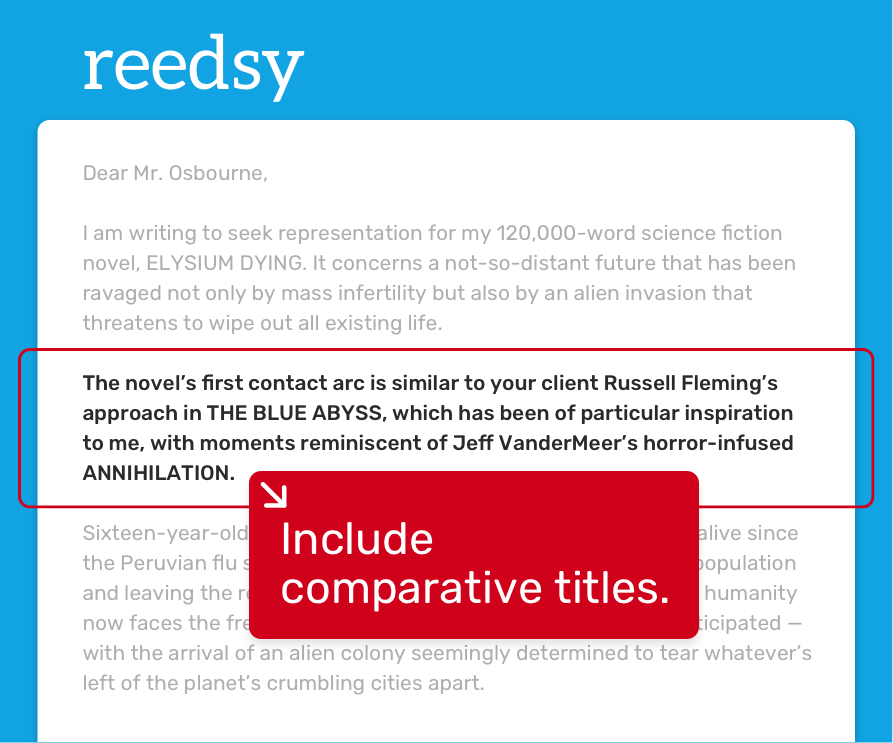
This sci-fi query letter checks a lot of the boxes you want in a query letter: it includes current and contemporary comp titles, to help the agent place the novel within the market, while also indicating a familiarity with the agent’s catalogue by including mention of one of their previous projects. It also makes good use of the author’s bookish bona fides.
Dear Minh,
I am writing to seek representation for my 120,000-word science fiction novel, ELYSIUM DYING. It concerns a not-so-distant future that has been ravaged not only by mass infertility but also by an alien invasion that threatens to wipe out all existing life. The novel’s first contact arc is similar to your client Russell Fleming’s approach in THE BLUE ABYSS, which has been of particular inspiration to me, with moments reminiscent of Jeff VanderMeer’s horror-infused ANNIHILATION.
Sixteen-year-old Hazel Windrow is one of the youngest people alive since the Peruvian flu struck fifteen years ago, killing 50% of Earth’s population and leaving the rest infertile. Extinction appears inevitable, and humanity now faces the fresh blow of it happening much sooner than anticipated — with the arrival of an alien colony seemingly determined to tear whatever’s left of the planet’s crumbling cities apart.
As her entire neighborhood scrambles to put as much space between themselves and the creatures as possible, only Hazel (herself a devotee of classic science fiction) sees the connection between the disease and the invasion, and suspects that the aliens are not as malevolent as they seem. Since the city’s electrical grid was wiped out by the aliens’ arrival, she has no way of communicating her theory to the higher-ups. So she sets off from her native Boston, headed for Washington, D.C. — but when she arrives, she’s confronted not by the remains of the government, but the aliens themselves, who have taken over the Pentagon and the White House.
While Hazel’s theory proves correct and she tries to spread the vital truth about the flu, she’s accused of being a traitor to her species and a mouthpiece for the aliens. Now she must convince the skeptics to cooperate before the aliens’ patience runs out, or else these new arrivals will attempt a far more drastic plan to force humanity’s hand.
I have an MFA from Temple University, where I studied under Nebula Award-winner Samuel R. Delany. I have also won several short fiction contests hosted by the SFWA, and recently compiled those works into an anthology entitled THE FALL OF DAWN, which I self-published under the pseudonym Jocelyn Rice.
Thank you for your time and consideration.
Sincerely,
Samantha Jackson
Following Lindsay Ribar’s advice, the query gives a strong sense of the novel’s story and stakes, which is especially important in genre fiction: agents receive a lot of queries, and don’t have time to follow up every vaguely intriguing synopsis! You’re much better off being explicit when describing the plot.
Q: What are the most common mistakes authors make in their query letters, and how can they improve them?
Suggested answer
One of the most common issues I see in query letters is the tendency to skip over who your main character is as the book starts. You want to show the agent who they’re going to be reading about and give the agent a reason to care about what happens to them. That’s your first paragraph (not including personalization or comp titles if you choose to put those at the top). Spend two to three sentences describing your character, their personality, their future plans, their desires, etc. That way, when the agent gets to the second paragraph and you throw chaos into the picture, they’re already thinking, Wow. How’re they going to deal with that?
Example:
Sixteen-year-old farm boy Luke Skywalker would do anything to leave his uncle’s dinky desert farm and attend fighter school with his friends. The evil empire is rising, and he wants to do his part to make the galaxy safe. But until his uncle agrees to foot the bill, Luke’s stuck cleaning the farm’s droids, a far cry from the adventure he seeks.
With an opening like this, you’ve established who we’re rooting for, his desires, and his ultimate goal. In the next paragraph, you can then drop the inciting incident, i.e. the thing that gets the story rolling.
Example:
Mary Collins is free of her wretched husband, their divorce finalized after a grueling three years where he fought her on every detail. Finally, Mary can leave the city where it was so important they live and return to her hometown. Helping her mom run the corner store while catching up with friends and family is the bliss she seeks as she starts over, now free of the myriad of obligations that came with being the governor's wife.
My guess is that Mary's going to find she's not so free of her past life once that second paragraph comes around. But because we know that's her desire/goal, it makes it that much more meaningful when the query then continues to throw havoc her way.
Giving us info about the character is important no matter your genre and age category.
If your book features a police officer, give us a bit of their background so we understand their current situation. That way, when chaos reigns, we know why that particular wrench is so bothersome. If a cop is trying to get promoted, being thrown into a big case is a dream/chance to show off. If a cop is near retirement, the last thing they want is to be trapped in a big case. Without knowing the main character’s background, your query is all about plot and you’re losing the character.
Agents, like readers, want to root for someone. They want to become invested in your character—so give it to them. Show them who they’ll be reading about and make them care. Then in the rest of the query, you can weave in those plot details and stakes.
Kim is available to hire on Reedsy ⏺
I like seeing the title, genre and comp titles at the top. Often, writers hide this info in the final paragraph. I want to know immediately what this book is and what it's about, along with where it could sit in the market. It quickly tells me if this book is for me and if the author even knows what their book is about.
Another misstep is writing far too much in your plot paragraph. It really should only be 1-2 short paragraphs. Think plot/premise/payoff. This is probably the hardest part for writers. You are very close to your own work and might feel overwhelmed by condensing the entire narrative into a handful of sentences. When I receive a query, I'm looking for your main character, their world, what has changed in their world, twists or turns along the way, and even a question you might have for the reader.
For bonus points, add a logline before your plot paragraph(s). It's an efficient way to hook the person you're querying.A query letter should be no more than one page. Finally, look up the agent or editor's name and address it to them with the correct spelling. First names are preferred. It feels old-fashioned to address a query with Mr, Mrs, Ms, etc.
Ariell is available to hire on Reedsy ⏺
A lot of query letters are too long. An agent will spend perhaps one minute scanning through your query letter, so make it easy for them to find the important stuff. And don't spend too much of your word count on the summary! The goal isn't to tell the agent everything that happens in the book; the goal is to mention enough selling points and hooks that the agent is intrigued and starts reading your sample pages. This means one, maybe two paragraphs of summary, in the basic format: "[Protagonist] wants [motivation], but [obstacle] gets in the way. They'll have to [challenge] if they're ever going to achieve [stakes]."
Nora is available to hire on Reedsy ⏺
I think that authors are sometimes so keen to get on board with a particular agent that they forget to keep their letters concise and professional and often volunteer personal information and background information that doesn't have a place in a query letter. The other thing I often see is authors including what almost amounts to a full synopsis of their book, whereas this should be presented in a separate document.
Vanessa is available to hire on Reedsy ⏺
Three words: be more specific.
The standard advice used to be: look to a book's back jacket description for an example of how to describe your book in a query letter. The truth is, over time, the trends in queries have evolved AWAY from what's used on the back cover of books. Book jacket descriptions tend to be more vague, and focus on general claims like, "a thrilling coming of age story." Also, book jacket descriptions often end with rhetorical questions like, "Will Eva find love before it's too late?" but rhetorical questions in a query tend to be an agent pet peeve.
Most of all, agents don't want to hear that you have a "sweeping love story." They have 50 other sweeping love stories in their inbox right this instant. They want to hear the SPECIFICS of your setup, conflict and stakes to know how your love story stands out from the others, or they'll be getting out the broom to sweep your query right back out of their inbox!
Michelle is available to hire on Reedsy ⏺
A couple of the most common areas I see authors make mistakes in their query letters include:
- Not using proper query format
- Making the Book section (what your book is about) section either too long or too short.
While there is some variation on a query format, the one I like to use is the Hook, Book, Cook method.
- Paragraph 1 is your Book. What the title of the book is, the word count, why you decided to pitch the agent, comparable titles, etc
- Paragraph 2-3 is the Book. Think of this like the blurb on the back of a book or on Amazon. You want to give agents just enough information that they want to know more, but not give the ending away. That's for the synopsis, as is going into greater detail about the character and story. For the query, focus on the primary characters with their primary goals and motivations, the overarching conflict and villains, and set up the stakes of what the heroes will lose if they fail
- Paragraph 3-4 is the Cook. You as the author! If you don't have any prior writing credits, that's okay. Include a short paragraph about what you like to do, or what you enjoyed about writing the book. If you do have prior writing credits, try to only include those that are most relevant to what you're pitching (example, it's likely not applicable to share that you had an article in a cooking magazine if you're pitching urban fantasy, unless that ties in some way).
When writing the Book section of the query, I often recommend to authors to go into their local bookstore and seek out books in your genre with descriptions you like. See how they introduce characters, conflict, what details they do (or don't) include. Emulate them with your own story. Queries can be difficult, but with practice they do get easier!
Sean is available to hire on Reedsy ⏺
Common mistakes in query letters:
- Not saying what your book is about and why your target audience will love it.
- Remaining a secret writer by not sharing who you are, your background, and your writing experience.
- Giving away too much of the story: Mr. A hates Mr. B and winds up killing him.
- Making assumptions about the publisher, the books it publishes, and those it doesn't.
- Making unrealistic promises: This book is going to be a best seller with 500,000 books sold this year.
Barbara is available to hire on Reedsy ⏺
There are a few common mistakes you can avoid when writing your query letters. Here are some "do's" and "don'ts."
- Include only your first and last name in the query. The agent has your email address, and that is the address they will use if they wish to contact you. Do not include any other contact information (unless requested).
- Address the query letter as the agent stipulates on their website. If they do not specify their preferred salutation, use their first name and last name, e.g., "Dear Jane Doe."
- Make your first sentence about what you and the agent have in common (e.g., "Dear Ms. Smith, On your website, you say you like working with authors who (fill in the phrases the agent used), so I'm excited to present my (state your word count, genre, and BOOK TITLE IN CAPS)."
- State your comps (competitive or comparative titles) in your first paragraph. With your comps, try to use one book that this agent represented. Don't use best sellers as comps. Don't use books published over 2 years ago (and not over 3 years) as comps. Be current. Do your research. If you can't find recent comps, do more research. Read every book you use as a comp. (As you read your comps, make notes about how each comp is like your book, and how it is not like your book. You'll need this information for your book proposal (for nonfiction), and you'll need to talk about this with the agent when they call you.)
- Make your query letter 300 words. Why? Because a 300 word count is industry standard. Because 300 words is what many agents allow for their online submission forms. Because 300 words (single-spaced) will fit on one printed page, in case the agent prints out your query. Because if you can write an interesting query letter in 300 words, the agent will know you're a pro.
- Format your query according to industry standards: single-spaced, left justified, 2 spaces between paragraphs. No tabs or indents. No bold or underlining. Put your book title in CAPITAL LETTERS.
- When emailing your query, always drop your letter into the body of the email. Never send it as an attachment, unless requested. Don't send a query snail mail unless requested. Write in the email Subject line as directed (e.g., "Query - Title of Book - Name of Author.")
- Don't follow up on your query letter (unless an agent has invited you to submit to them). If you have sent an unsolicited query, if an agent says on their website their response time is four to eight weeks, and at eight weeks you haven't heard from them, query other agents (but not in the same agency). No response from an agent is a "No." Don't take it personally ... just move on. Your perfect agent is out there, waiting for your query letter!
I wish you every success with querying.
Michael is available to hire on Reedsy ⏺
One big mistake is querying the wrong agent. Sending your 90,000 word adult fantasy to an agent who specializes in literary nonfiction will only result in a rejection. This does not mean that you do not have an amazing story, but rather that that particular agent cannot best service that particular story. As a writer, make sure to do your research to find the best agent for your work.
Hope this helps!
Samantha is available to hire on Reedsy ⏺
Nonfiction query letter
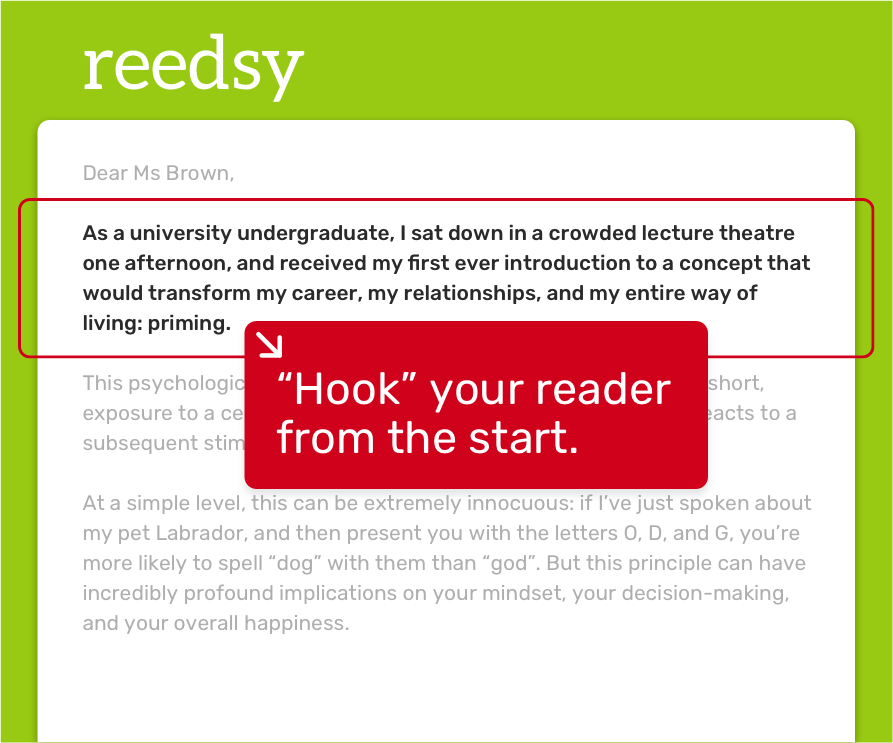
This nonfiction query is an example of the use of a “hook” to open a query: according to editor Jon Michael Darga during feedback, “it's intriguing, carries significance, and we want to know more. I've no idea what priming is, but now I want to know!”
Dear Ms Brown,
As a university undergraduate, I sat down in a crowded lecture theatre one afternoon, and received my first ever introduction to a concept that would transform my career, my relationships, and my entire way of living: priming.
This psychological phenomenon is as powerful as it is simple. In short, exposure to a certain stimulus can influence the way a person reacts to a subsequent stimulus. At a simple level, this can be extremely innocuous: if I’ve just spoken about my pet Labrador, and then present you with the letters O, D, and G, you’re more likely to spell “dog” with them than “god”. But this principle can have incredibly profound implications on your mindset, your decision-making, and your overall happiness.
In PRIMED FOR ERROR, my 70,000-word scientific self-help book, I lead my readers through the story of how I used priming as a tool to access memories and alter my “impostor” mindset, rocket-boosting my academic career. I’ll also show them how priming myself for healthy, positive communication saved my struggling marriage, as well as teaching them how they can apply the principles of priming in their own lives. Weaving together 200 years of psychological research with my own experiences (and those of famous proponents of the method, including Nobel prize-winners and Hollywood A-Listers), I cover broad ground with enough specificity and hard scientific evidence to reassure readers they’re in safe hands.
I actually listened to your excellent panel at the 2020 UK Nonfic Pick conference, where you discussed the porousness of the self-help and popular science genres and how you’re looking for more books that straddle that line, and I believe PRIMED FOR ERROR strikes that balance in an innovative way, through the incorporation of elements of memoir and personal anecdote within a wider scientific framework.
Beyond my personal experience using the principles of priming, I have a PhD in behavioral psychology from Marlowe University, where I have experience lecturing undergraduate and postgraduate students in areas related to this topic. My hope is to bring my academic and teaching backgrounds together to present robust science in an accessible way, similar to Daniel Kahneman’s THINKING, FAST AND SLOW. I’m also a great admirer of your client Marcus Hardy’s latest release BALANCING THE DECK, as his approach to popular science is informed by both highly personal and rigorous historical lenses, a holistic methodology I adopt in my own teaching and writing.
PRIMED FOR ERROR has been a years-long passion project, and I am excited to finally be bringing it out into the world. I’ve attached the complete manuscript for your consideration, and I thank you for your time.
All the best,
Hannah Gardener
The query also clarifies to the agent what materials the author has available (here, the complete manuscript), which is especially important when querying with a nonfiction title, where you could be submitting either a book proposal or a full manuscript. This helps the agent know where you’re at in your writing journey straight away.
Get a professional query letter review today
Katie R.
Available to hire
Literary agent specializing in women's fiction, romance, and fantasy. See my bio for the current query letter deal!
Michael S.
Available to hire
Versatile editor of award-winning fiction and nonfiction with 20+ years' industry experience.
Leila B.
Available to hire
Children's developmental editor (Chronicle, Macmillan, S&S) with 12 years' experience and faith that children's books can change the world!
Memoir query letter
This letter also makes use of a brief hook, before moving swiftly into the meat and potatoes of the query - the necessary details about the book that the agent really wants to know, including word count, genre, title.
Dear Kevin,
In my thirty years as a foster mother, I had one rule: no teenagers. I was certain that I couldn’t meet the unique challenges of caring for older children. Then, one November night, along came an emergency placement—fifteen-year-old Kay.
In my 100,000-word memoir HIDDEN PARENT, I discuss the shift in my relationship with parenthood, love, and family which Kay precipitated. Upon her arrival, we argued constantly, with neither of us knowing how to navigate this strange new family dynamic. It began to seem that our situation was untenable — but we were stuck with one another. Our struggles were only exacerbated by the bemused scepticism of my own family and friends who, aware of my longstanding no-teens rule, were certain our little unit wouldn’t last.
But as we became comfortable with one another, the growing bond between us opened my eyes to an entirely new type of foster family. I realized that what made me a parent wasn’t a child being reliant on me, but a child trusting me enough to let me into their life. It’s this realization, and the bumpy road that led me there, which I explore with equal parts humor and sensitivity in HIDDEN PARENT, my first book.
Alongside the hundreds of thousands of families adopting or fostering within the US every year, I feel my story will resonate with a broad audience of parents, both biological and non-biological, who at times doubt whether they can handle a child’s emotional needs. As a blogger who writes regularly about my experiences parenting, I have already built up a community of 3,000 regular readers who are attached to my story, and seeking guidance for their own journeys. Wanting to connect even further with this audience is another reason why I wrote this book, an accessible resource for those struggling with the “big questions” of parenthood.
My book is thematically complementary to several works in your catalogue, such as David Lower’s FOUND FAMILY, touching on similar ideas of family as an ever-evolving and flexible entity, which you can nurture even without biological relation. I also know that you count Evie Gray among your roster of clients, whose newest title MIDDLE YEARS resonated deeply with my experiences, and while my book takes a more personal approach to the topic as a narrative memoir, I would be honored to find myself in such company.
I thank you for your consideration.
Sincerely,
Tanya Hartman
Q: Do you have any words of encouragement for authors struggling in the querying trenches?
Suggested answer
First of all: don’t give up. Rejection isn’t the end of the story—it’s part of it. Every “no” is simply a redirection toward the right “yes.”
Publishing is absolutely a business, but it’s also deeply relational. Editors and agents love working with people they genuinely like and trust. That means: go to writers’ conferences. Join a critique group or hire an author coach. Get to know professionals in the industry, not just for what they can do for you, but for how you can show up as generous, authentic, and collaborative. You never know when a writer friend might one day endorse your book, or when a connection you make over coffee might become a career breakthrough.
And here’s the bigger truth: querying is more than chasing contracts. It’s also a personal growth journey. You’ll discover your resilience, refine your craft, and grow into the writer you’re meant to be. One author I know literally turned her pile of rejection letters into a lampshade and said they helped light her way to publishing three novels.
Need more inspiration? Catherine Stockett, author of The Help, was rejected by 50 agents before one finally said yes. That “yes” led to a book deal, a bestseller, and eventually, a movie.
So hold fast to your dream. If you feel called to write, you probably are. Keep writing. Keep connecting. Keep becoming the kind of author people want to root for. The path may be long, but you’ll be stronger, wiser, and more yourself because of it.
Alice is available to hire on Reedsy ⏺
Querying can be emotionally challenging and overwhelming for authors. Once you're in it, you're amongst a sea of probably tens of thousands of other authors at the same time, and there are, of course, only so many agents and agencies out there. Truthfully, the odds are not great; an agent will sign only about 1-3% of the authors they come across in their queries. This is why the query must be in tip-top shape: a query's only job is to make the agent curious enough to ask for pages. Then, they have to fall in love with the pages (the writing and the story, which are two different things) and have a vision for it in the current market.
If you go into it with the right mindset, it can make it easier. Expect to receive many passes; it's inevitable in 99.9% of cases. Your story isn't for everyone; no one's is. And there are so many reasons an agent might pass. Try not to take it personally; if they pass, then they were not the agent for you. You have to have thick skin though. Not every agent will reply, and if they do, they may give feedback or a reason they're passing or they may not. It's hard not knowing, but there's not much you can do about it. Agents are not paid for the time they spend on queries, and their top priority is the clients they already have, so unfortunately, queries often fall to the bottom of the priority list. And because we receive so.many.queries, it's very difficult to stay on top of them all. We simply don't have the time to respond to everyone. All you can do is do your best; ensure your query is spectacular so that it stands out, your pages are spectacular so agents see it as ready or nearly ready for submission to publishers, and research the agents and agencies first so you know you're shooting your shot with the most appropriate people in the industry. Follow their submission guidelines, don't cheat, and be friendly and professional. Get several pairs of fresh eyes on your query so you know it contains all the necessary elements (and doesn't contain anything that shouldn't be in it) as well as your manuscript, and make sure everything is ready before you begin querying. Being prepared says a lot about your work ethic, which is important to agents as well
It sounds cliche, but the only difference between those who find representation and those who don't is that the authors who found representation didn't give up. It takes patience, persistence, and perseverance. And it may not happen with your first completed manuscript, or even your second or third--but if your goal is to find an agent and be traditionally published, keep going. Keep learning, keep trying, keep connecting with other writers and industry pros. You've got this!
Kathleen is available to hire on Reedsy ⏺
Don't be afraid to tear up your query letters and start again. Be aware of the time of year -- you may be going 24/7/365 but agents and publishing houses don't do that. Check out Writer's Digest articles on query letter writing and examples of winners and losers. Check out Query Shark. Understand the different agent types and editors at small presses -- different query styles may be required. Send queries out, mark the calendar 4 weeks from that date, and forget about them until then.
Query letters are not a sales letter about you -- you love your book, your letter needs to make anyone want to love your book as well. :O))
Check out writing blogs/websites such as those of folks like Anne R Allen or Janice Hardy -- or any author you admire -- their tips on query letters may include something you've never considered.
Start your next book... c'mon! You might be surprised what's waiting to pop outa your head!
Maria is available to hire on Reedsy ⏺
Querying is so tough these days! There's more agents than ever before, but yet imprints are folding, combining, etc. so the number of projects being sold hasn't increased, making it harder to catch an agent's eye.
There may be any number of reasons you're not getting full requests--your query letter doesn't capture the unique quality of your book making it stand out, your first pages fall flat and don't pique the agent's interest, or, quite simply, the agent isn't interested in your characters or plot. And there's nothing you can do about that last one. Every book isn't for every person. Every agent has meh topics they rather not read about. If an agent isn't into mermaids, they're unlikely to request a full from a query that describes a book about mermaids. That query was never going to land a full, and there was absolutely nothing about the query or your writing that could have changed that.
So, concentrate on what you can control and push aside the rest. Querying is not a comment on your worth as a human or as a writer. Publishing is a fiesty marathon. If your current project isn't getting bites, write the next thing. You'll improve with each project. Trust that the stars will eventually align when your idea and words will pack a punch. How can you make your project stand out as unique? What tropes can you put a spin on? Create characters we can't help but root for. Lean into what you--your background, your hobbies, your experience, can bring to a project that springs it to life in a way that can't be replicated.
But above all, know that it's not just you--the struggle is real for many, and the only thing you can do is simply keep writing.
Kim is available to hire on Reedsy ⏺
Don't lose faith!
I know that's easier said than done but try not to let rejections get you too demoralized. Most best-selling authors had the same struggle and likely went through many rejections before securing a deal. Unfortunately, it's all part of the process.
If you are getting form rejections then it is likely you are either choosing the wrong agents or there are issues with your query pack, so make sure you put as much work as possible into researching who you want to pitch to and refining your documents. Don't rush into querying. This is your one shot to catch the attention of that agent, so you want to get it right.
If you are getting requests for your full manuscript then you are likely on the right track and have a good submission pack. Don't be afraid to ask for feedback, but agents are very busy so you may not always get it.
I would also encourage you to keep writing while querying. Authors often get their second or third book picked up instead of the first one they queried, so don't lose hope. If you are tired of the rejections then use any feedback you have been given to write something new. There are no guarantees, but keep working at it and hopefully you will find your perfect agent eventually.
Finally, be kind to yourself. A rejection doesn't mean your book is rubbish - it just means that the agent can't see a place for it at this point in time. Many, many, many brilliant books have been turned down initially and then had great success when they found the right home. Don't give up hope.
Amy is available to hire on Reedsy ⏺
Following Kimberley Lim’s advice, the query includes an indication of the book’s tone when it points out that it’s a good-humored reflection on the topic. This helps the agent get a real feel for the work and the reading experience, beyond the general subject matter.
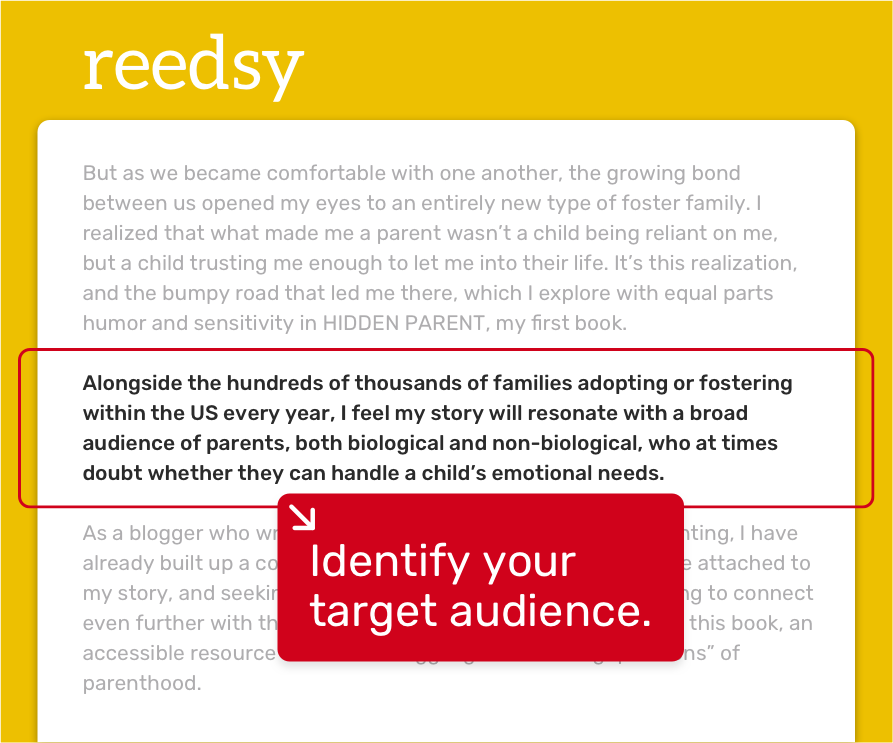
Mentioning a particular target audience is also good: agents already know that readers outside the target market could enjoy a book, so this goes without saying. But by being specific, and focusing only on those they are actually writing for (here, parents), the author gives the agent insight into the commercial potential and a possible marketing angle for the book.
Thriller query letter
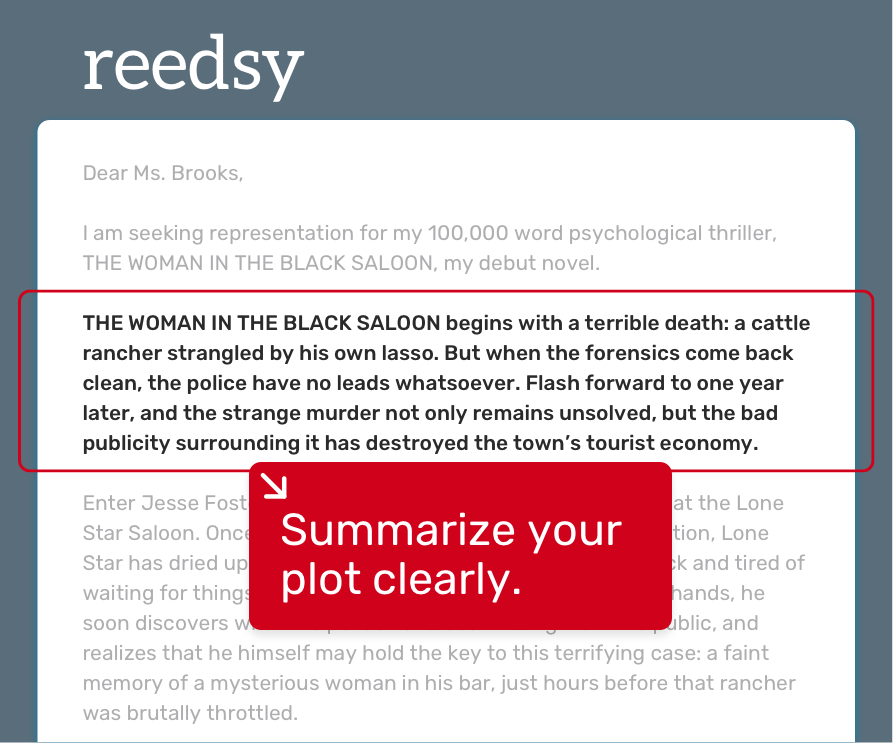
This query is a great example of efficiency, according to agent Andy Ross. The synopsis brings out the concept quickly, leaving space in the letter for other important information, such as background on the writer and their author platform.
Dear Ms. Brooks,
I am seeking representation for my 100,000 word psychological thriller, THE WOMAN IN THE BLACK SALOON, my debut novel.
THE WOMAN IN THE BLACK SALOON begins with a terrible death: a cattle rancher strangled by his own lasso. But when the forensics come back clean, the police have no leads whatsoever. Flash forward to one year later, and the strange murder not only remains unsolved, but the bad publicity surrounding it has destroyed the town’s tourist economy.
Enter Jesse Foster, proprietor and sole remaining bartender at the Lone Star Saloon. Once a thriving local business and tourist attraction, Lone Star has dried up with the rest of the town — and Jesse is sick and tired of waiting for things to get better. Taking matters into his own hands, he soon discovers what the police have been hiding from the public, and realizes that he himself may hold the key to this terrifying case: a faint memory of a mysterious woman in his bar, just hours before that rancher was brutally throttled.
This story has all the dark small-town secrets of a Gillian Flynn novel with a distinctive southwestern spin — it's about a small town in Texas that’s turned upside down by a twisted, Western-inspired murder. It should appeal widely to fans of all kinds of suspense, from classic murder mystery to contemporary thriller.
I’ve also already started promoting it to my own fans — I’ve had several crime fiction short stories published, and run a true-crime blog called “Crime Time with Detective Jay” that gets about 500 unique viewers a month. This novel was actually inspired by a case I wrote about on the blog (though I won’t say which one).
My very best,
Jeremy Baker
The inclusion of metrics in the form of blog hits is helpful for an agent, and definitely adds value to an otherwise unknown author’s query. Knowing that an author has a pre-existing platform can be a helpful tool for agents when trying to figure out the potential reach of a project, so include any social media or blog following you might have.
Q: When is it appropriate for authors to follow up on query letters, and how long should they wait before doing so?
Suggested answer
Check with the agency's or agent's guidelines on this; often, there will be something on the website or on the query form that will say something like, "If you don't hear back within X weeks, consider it a pass" or even, "Please wait X weeks before following up." Always follow the guidelines.
Unfortunately, it can take a long time to hear back--there are many more authors out there than there are industry professionals, and there just isn't as much time to dedicate to queries as we would like (it's also unpaid time). Most agents won't mind receiving a nudge, but I recommend waiting at least 3 months/12 weeks before doing so (unless they specify otherwise on their website). Keep it short and friendly and professional as possible. If they specify on their website not to nudge, please be respectful and don't nudge.
An exception would be if you have received an offer of rep or an offer to publish by an indie press. If that's the case, congratulations! Typically, you would contact any agent that still has your query (especially if they have requested pages) and give them a timeframe (usually about 10 days to 2 weeks) to get back to you by. (Please do not nudge with an offer of representation if you have not actually received an offer, though.) That way, they have the chance to prioritize your manuscript and counter with an offer, if they love it enough.
Sadly, if you don't hear back in another few weeks after a nudge, it's likely a pass, and I don't recommend nudging again.
Kathleen is available to hire on Reedsy ⏺

Agents and editors are on Reedsy
Meet experts who know what makes a query stand out.
Learn how Reedsy can help you craft a beautiful book.
Romance query letter
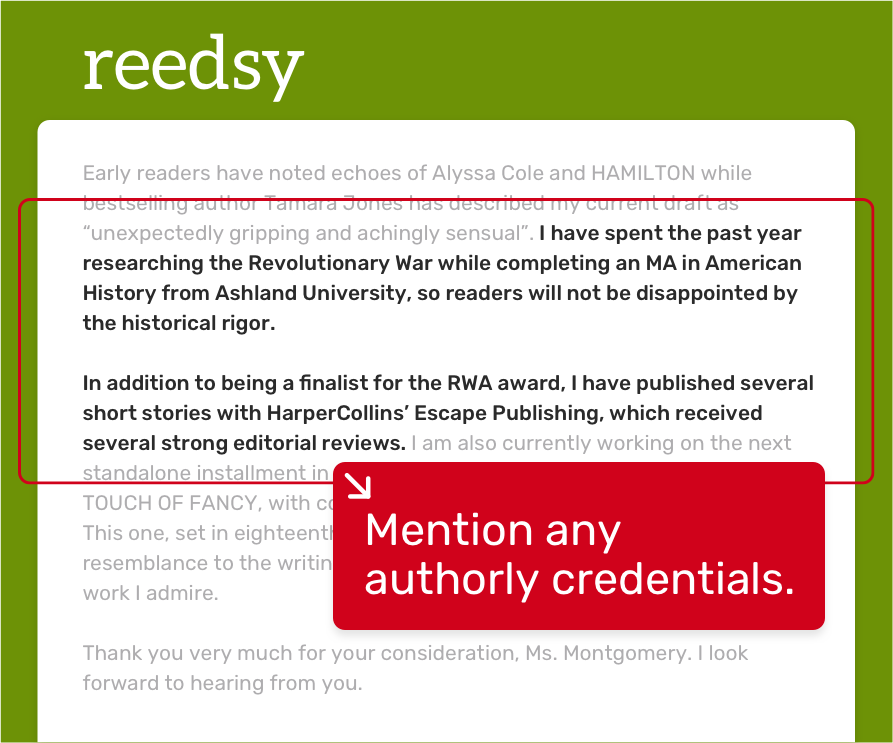
Following feedback from Marsha Zinberg, this letter was edited to make sure its tone was suitable for a query, selling the story without veering into pulpy back cover copy. It also gives insight into the other works in the authors’ catalogue and their authorial credentials.
Dear Joyce,
I’m seeking representation for my 80,000-word historical romance novel, FIRE AND SILK: a forbidden romance that unfolds against the backdrop of the American Revolution. This book is a sequel to my previous novel, Midnight Rose, which was shortlisted for the RWA Katie Fforde Debut Romantic Novel Award last year.
The fiery half of FIRE AND SILK, blacksmith Joseph Ramsey, has never been interested in ladyfolk — nor does he have time to pursue them, working from dusk till dawn to fulfill his commissions and covertly supply the Continental Army with weapons. Elizabeth Davis is a high-born woman who approaches Joe with a strange request: a gun with which to kill her fiancé, a charismatic and influential general in the Continental Army who commands a garrison key to the region’s defence.
If he fulfils the mysterious young woman’s request, it would mortally wound the revolutionary effort. But her beauty, sparkling wit, and tragic air prove difficult to resist, and so Joe is torn between his until-now unwavering duty to the cause, and his passion for Elizabeth. As the connection between the blacksmith and the lady heats up, Joe finds himself caught in the crossfire...
Early readers have noted echoes of Alyssa Cole and HAMILTON while bestselling author Tamara Jones has described my current draft as “unexpectedly gripping and achingly sensual”. I have spent the past year researching the Revolutionary War while completing an MA in American History from Ashland University, so readers will not be disappointed by the historical rigor.
In addition to being a finalist for the RWA award, I have published several short stories with HarperCollins’ Escape Publishing, which received several strong editorial reviews. I am also currently working on the next standalone installment in my “Revolutionary Lovers'' series, entitled A TOUCH OF FANCY, with completion expected within the next six months. This one, set in eighteenth-century France, bears some thematic resemblance to the writings of your client Claudette Sauvageot, whose work I admire.
Thank you very much for your consideration, Ms. Montgomery. I look forward to hearing from you.
Warm regards,
Vivian Day
While it shares information about other titles in the series, this query wisely doesn’t try to query an entire series at once: this tactic is unlikely to get authors very far, and is against standard query letter protocol. Instead, writers should focus on querying for one title, while mentioning any other works that would be relevant to the agent, as the author has done here.
Q: What unspoken rules do agents or publishers expect authors to follow when submitting a manuscript or proposal?
Suggested answer
Double-spaced, Times New Roman, one-inch margins, twelve point font.
Kate is available to hire on Reedsy ⏺
Don't forget to keep track of all of the agents you query! You can develop your own system for this, but a simple spreadsheet will do the job at the end of the day.
Your query letter will be just as unique as your book, but we hope that getting a sneak peek into the query review process and looking over our examples has provided you with some insight into the best practices and pitfalls of writing a query. Be sure to check out the rest of this series for more tips on writing a fiction query letter and choosing those all-important comp titles!
Finally, we created three more query letter examples for you to save as images or share with your fellow author friends.
